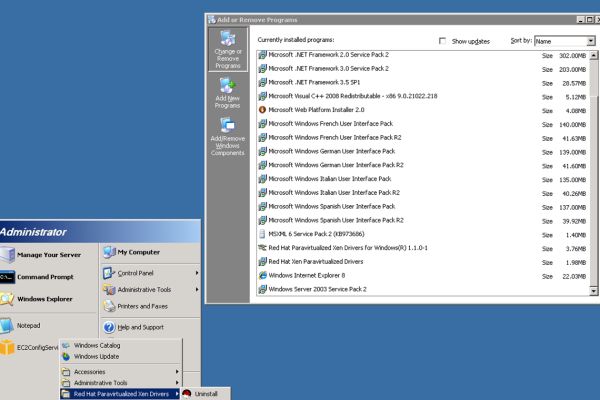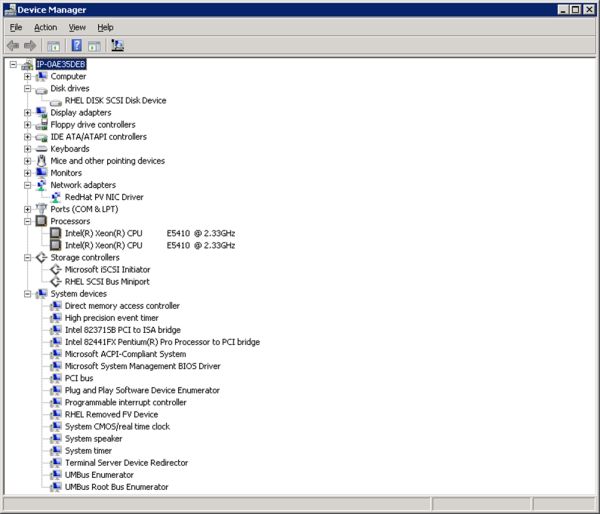Ask the experts: Cloud Computing Questions Answered
by Johan De Gelas on March 28, 2011 7:25 AM EST- Posted in
- Ask the Experts
- CPUs
- Cloud Computing
What Would the Benefits and Disadvantages Be for Moving a Site like AnandTech to Amazon EC2?
It is very easy to startup an Amazon EC2 instance. An instance is a combination of a certain amount of virtual hardware running on top of Xen and an operating system “template”. All instances have the right Xen drivers already installed, so that saves some time. Below you can see the Windows 2003 instance with the Xen paravirtualized drivers installed.
You simply browse to the website, choose the right instance and pay with your credit card.
It is also relatively easy to make an Amazon EC2 based site scale out quickly, so sudden peaks (e.g. Anand writing about the newest SSD) are not a problem anymore. And you pay only for the time and the resources that you actually use. That is a huge advantage compared to buying and maintaining enough servers to handle some hard to predict peak load.
However, there are some disadvantages too. Amazon’s EC2 "normal" disk performance is pretty bad, even sequential access gets hardly past 20-30 MB/s. Typical disk performance with a bit of random and sequential access is sometimes as low as 3 MB/s.
Secondly, most processors in the Amazon datacenter are Xeon 53xx “Clovertown” and Xeon 54xx “Harpertown”. And despite the fact that most of them are running at 2.33 GHz, an EC2 compute unit is no more than half a core, or a Xeon running at 1.2 GHz.
Thirdly, you better size your “normal” virtual machine very well, because there is a huge difference between the pricing for a small, medium or large instance. A large instance easily costs three times as much as a medium one.
One last tip: make sure your webservers run on linux. A linux instances costs about 50% less than a Windows one!












40 Comments
View All Comments
Philippe Creytens - Monday, March 28, 2011 - link
Google Apps does support AD sync:http://googleenterprise.blogspot.com/2009/04/sync-...
HMTK - Monday, March 28, 2011 - link
It's still only a synch, not a true integration. I was thinking more along the lines of Sharepoint - Office - Exchange - Unified Messaging ... and all the nice management tools you get with AD. AFAIK you lose a lot of functionality by moving to another platform.If you put one of the elements (say, Exchange) in someone else's cloud you're basically trusting that other company to keep your data safe and private. A company may be certified as much as it wants, if it gets served a search warrant it has to comply but will the customer know? Doubtful, especially when we see how some governments work.
andyleung - Monday, March 28, 2011 - link
I have no idea why people are still so behind in 1990 time. What's so good about AD nowadays? We have all mobile devices popping up every year. Your BB doesn't have AD integrated too and so what? Your company is still using it. You don't have Gmail integrated with AD and so what? I don't think people would have problem logging in Gmail with a separate login as they do for all other email today anyway. And business can leverage other Google apps to help build business processes, which is a big plus.zeppelin55 - Monday, March 28, 2011 - link
I work for a company that struggles with outsourcing/cloudsourcing anything. We're also a growing company that very well may be a large enterprise sometime in the future (300+ employees). When I've looked at remote exchange providers there seems to often be user limits. Is this something to be concerned about?namo - Monday, March 28, 2011 - link
Author says Exchange account costs $100 user-year (it is unclear if it is only license fees), Gmail $50 user-year. But author didn't mentioned that small business can have hosted email server with $0 license fees using open source software and maintaining it could be very inexpensive if business owner will be smart enough to hire <b>part time<\b> administrator.MLSCrow - Monday, March 28, 2011 - link
For some of those that are criticizing this article, it wasn't meant to be that much of an in-depth discussion as it was more of a high level overview to answer some general questions regarding cloud benefits. Given what should have been obvious, I will also go on to refute the claim that the article ignores the fact that Google Mail doesn't integrate with AD. On the contrary, did you not read the part as follows, "The only thing where I find our Exchange server to be slightly better is the scheduling events in calendar since the exchange server is integrated with the Active directory server." This already insinuates that Google doesn't integrate with AD. Did you even read the entire article? lolbplewis24 - Monday, March 28, 2011 - link
Of course they didn't read the whole article. You are dealing with people who are simply anti-Google here. Some didn't even bother to differentiate GMail with GMail for Business with their criticisms.rowcroft - Monday, March 28, 2011 - link
MS Online Services is $5/month for 25GB of storage. Integrates with AD to boot.scotth501 - Monday, March 28, 2011 - link
I'm seeing it for $10 including Sharepoint and Office Communicator IM with audio conferencing:www . microsoft . com/online/business-productivity.aspx
(I guess I'll keep writing something since this is spam somehow according to the system. I wonder if this is enough of a comment to make it through.)
Well, no, it was not. Maybe there should be a definition regarding what constitutes spam so I can format my reply appropriately.
So, maybe 4th time will be the charm, I guess I'll edit the above URL so it's not usable and maybe that'll pass this ignorant system.
Sivar - Monday, March 28, 2011 - link
<b>GMail is not a business tool. Period.</b>http://www.formortals.com/gmail-is-not-a-business-...
I think GMail is great. After using it at home for years, I can barely stand using Outlook at work. The linked article does, however, raise some points worth considering.